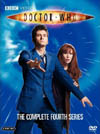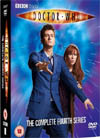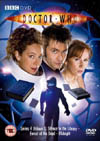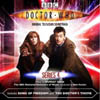DVD Extras (box sets only) include:
But, we shouldn't get too excited too fast. This show is the budget-crunching cheapie for the season. While at least using the solid backbone of the who-do-you-trust bottle story defense-against-the-unknown plotline, the action becomes a little TOO confined to make the formula work, and at no point really gives any member of the cast anything effective or constructive to do.
Now we come to this story where Russell T. Davies basically makes a high ranking series like Doctor Who feel like it's turned into "Space: 1999". The story's bottle is full of characters without real skills to understand or deal with the unknown, and like the rats in a box, they start gnawing on each other before long. The Doctor is usually expert at blasting past such foolishness and dealing with the heart of the matter at hand, but all this is deliberately stripped away from him by Davies, until he is powerless to salvage quality interaction amongst the story's characters. Now to be fair, this is partly a story point, thus limiting itself to the bulk of this episode until said point is well made, unlike the endless inability of "Space: 1999" to figure out how to rise above it to deliver quality science fiction. This tale is also expertly acted and directed to keep you glued to your screen wanting to see how it all turns out, and what exactly is behind it all. I just don't find this story point to be interesting or noble enough to sustain the main plot of 45 minutes of television, at least not if it wants to earn decent ranking within the season. What is more interesting, and remains one of the story's successes, is the psychological mystery of what the enemy force is, something perhaps intangible enough to survive the deadly extonic rays outside, something that possibly evolved on a world of crystalline life forms, where each segment patterns itself based on the segment adjacent to it, until patterns form in both structure and resonant thought waves.... So despite the very weird humanoid character dynamics we get, the setting and the words describing the setting go a long way to supporting the concept scientifically and dramatically. It's just too bad more time, possibly nearer the end of the story, couldn't have been spent properly exploring this idea on screen, instead of descending into anti-heroic, unfocused retardation. The crystalline parallels to the copying phenomenon no doubt escape the bulk of viewers in the finished product. It's enough to make one envy the exploration of crystalline life in "The Krotons" (story no. 47 - one of the few complete Patrick Troughton tales, and slightly underrated in my opinion). Seriously.
And sadly, this is not a story where the climactic final act by the protagonists is something that the Doctor does himself, nor is it something to be proud of. Not Doctor Who's finest hour by any stretch of the imagination. It is also worth noting that this story continues the recent trend of leaving out any and all materializations of the police box - in fact the TARDIS does not appear anywhere in this story in any capacity. Thankfully, the story is so focused on its own areas of interest, that one doesn't miss the TARDIS in this adventure. We know it's done its job in terms of taking our main characters to a fascinating new place in the galaxy and broadened their horizons, and that's enough. But it does make it more important that materialization be taken better care of in those prior stories that do need it: "Silence in the Library", "The Doctor's Daughter", "The Unicorn and the Wasp", "Planet of the Ood".... and on and on to include most of David Tennant's era in fact. And it is also worth noting that this episode shatters a very long-held record on Doctor Who - that of the longest continuous scene. That record was held by "The Edge of Destruction" (story no. 3), whose second episode "The Brink of Disaster" began in the TARDIS console room and stayed there for 18 and a half dramatic minutes. "Midnight" now begins a scene after the Doctor comes back from the driver's cabin and stays in the passenger's room with him for 29 minutes and 13 seconds. That's longer than most entire episodes of the classic series. Mind you, in 1963 when "The Edge of Destruction" was made, they would do 18 minutes all in one take, and not spend two weeks shooting it as was the case here. "The Brink of Disaster" probably still holds a record in that regard. Nicely, most of the mysteries brought up in this story are never definitively answered, art now leaving room for the ideas of the audience to fill in the blanks. Good show. It's just too bad the exploration of the concepts got pushed so far under the rabid displays of bad character.
International Titles:Deutsch: "Geisterstunde" oder "Die Stimmen"Magyar: "Éjfél"Français: "Un passager de trop"Русский: "Полночь"Italiano: "Midnight"This story has become available on DVD. Click on the Amazon symbol for the location nearest you for pricing and availability:
Note: The full season sets contain commentaries, behind-the-scenes featurettes, and other extras. The smaller volumes only feature the plain episodes. Comments on this article are welcome. You may contact the author from this page:
|









